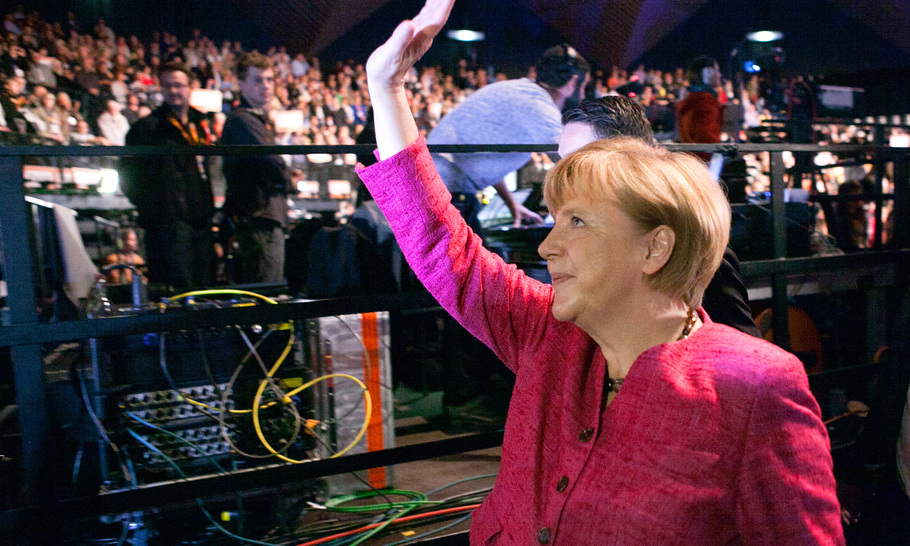Merkel has finally taken responsibility for her party's decline. She can't cling on for much longer.

Krisztian Bocsi/Bloomberg via Getty Images
Angela Merkel’s resignation as chairwoman of the Christian Democratic Union (CDU) after 18 years had become inevitable after a disappointing federal election last year, followed by a series of setbacks in regional elections, most recently in Hesse. She remains in office as Chancellor, a post she has held since 2005, but her legendary status as a political survivor will now be tested for the first time.
In Germany the Chancellor is not necessarily also the party leader or chairperson. Willy Brandt, for example, was chairman of the Social Democrats (SPD) for 33 years, from 1964 to 1987, but only held the Chancellorship for five years, from 1969 to 1974. However, Mrs Merkel’s great predecessors Konrad Adenauer and Helmut Kohl held both posts throughout their time in the chancellery, and saw the party leadership as an essential power base. It remains to be seen whether Mrs Merkel can cling on as Chancellor without maintaining her hitherto iron grip on her party.
Mrs Merkel has been in office for 13 years, nearly as long as Adenauer and Kohl, but she has far less to show in achievements. Her decline began long before the migration crisis erupted in the summer of 2015, but the absence of serious rivals either in the CDU or the opposition SPD enabled her to ignore the gradual loss of her popularity. She was good at letting colleagues take responsibility for her mistakes, but the influx of more than a million Muslims could not be blamed on anyone else.
She has struggled to regain authority ever since that fateful moment of midsummer madness, when she appeared to signal that Germany (and by extension Europe) could accommodate unlimited numbers of refugees from Syria. For the first time since 1945, a new party was able to consolidate itself to the Right of the CDU and its sister party in Bavaria, the Christian Social Union. The Alternative for Germany has no leader to compare in statesmanship with Mrs Merkel, but it gives a voice to the millions of Germans who are frightened and angry with the ruling “grand coalition” of CDU and SPD.
What this means is that the centre Right no longer dominates German politics, as it has done for most of the history of the Federal Republic. It is no longer inconceivable that the radical Right could challenge the CDU for supremacy. Indeed, the two coalition parties together now regularly poll under 50 per cent. Meanwhile, the radical Left is also resurgent: the Greens have overtaken the SPD in recent months for the first time ever, while the former Communist Left Party still has an appeal in the former East Germany.
“Her whole career has been based on her very ordinariness, her absence of charisma and her readiness to shoulder responsibility.”
A total of six major parties now view for office, the same number as in the last years of the Weimar Republic. Germany’s political fragmentation can be laid squarely at Mrs Merkel’s door. The country that for half a century prided itself on being Europe’s most stable political system has become one of the least predictable on the continent. Political violence, often associated with Muslim immigrants or neo-Nazi demonstrations, has returned to the streets of Germany for the first time since the student agitation of 1968 and the far-Left terrorism of the 1970s.
Chancellor Merkel is not finished yet. She still has a majority in the Bundestag that is unlikely to overthrow her in the short term. Indeed, the levers of power that come with her office were originally intended by Bismarck to be independent of parliamentary control. In theory she could seek new coalition partners such as the Greens and remain in office without an election. But in practice the nimbus of authority has been dissipated by her evident inability to come up with new policies or ideas.
The mantra of “more Europe” no longer cuts any ice in a country that feels all the more burdened by its responsibilities in the EU now that Britain, the second largest net contributor, is leaving. The euro has been very advantageous for Germany, but it brings with it the unpopular role of imposing austerity on other member states, most recently Greece and now Italy.
Mrs Merkel is a wily and ruthless politician who has no hesitation in ditching unpopular partners or policies, but she seems to have lost her touch. Sheer boredom and overfamiliarity is also a factor. She cannot reinvent herself as a populist of the centre Right, as Emmanuel Macron has done, even if that were acceptable to the German public. Her whole career has been based on her very ordinariness, her absence of charisma and her readiness to shoulder responsibility.
Now she has taken responsibility for her party’s decline. It looks as though she may have done so too late. Angela Merkel has led Europe from behind, from one crisis to another. It is hard to believe that she is now the woman to lead Germany from the front.





